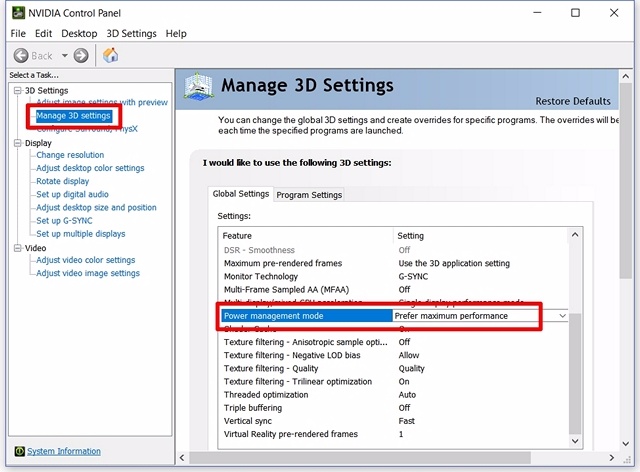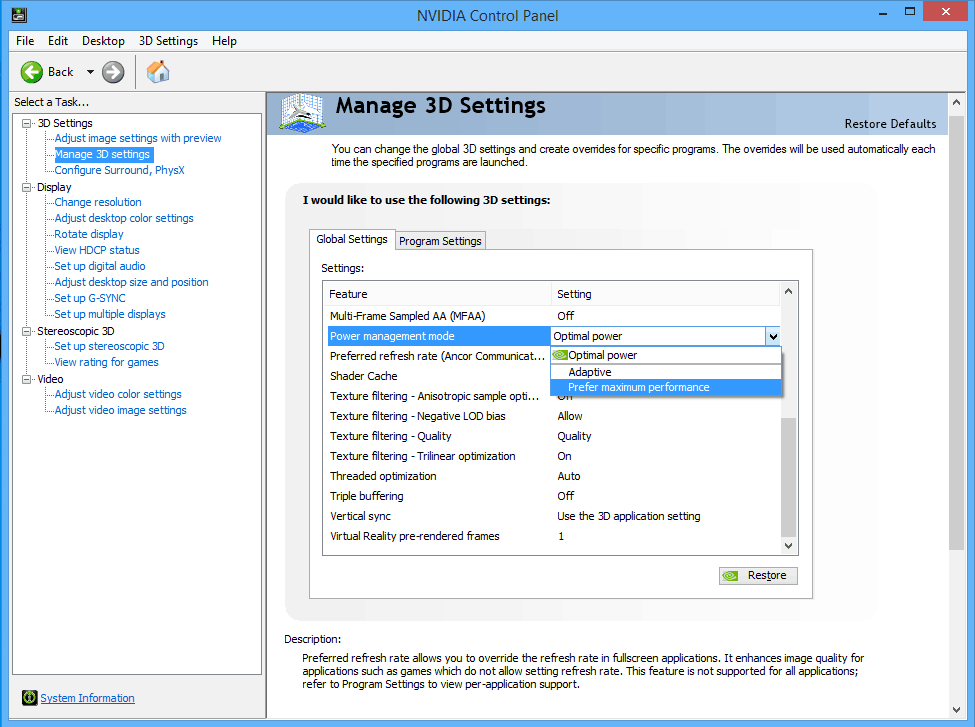

- #Nvidia gpu power management mode how to
- #Nvidia gpu power management mode install
- #Nvidia gpu power management mode drivers
Follow these recommendations with care, and you'll notice a difference, unquestionably. The following steps are tailored to alleviate issues like low fps and stuttering, thereby enhancing the gaming experience.

Best NVIDIA Control Panel Settingsįor players using an NVIDIA graphics card, tweaking the NVIDIA Control Panel settings can indeed bring a significant performance boost in Baldur's Gate 3. If assets are loading slowly while playing the game, you may also consider increasing the page file size when this setting is enabled. This mode uses more RAM and VRAM to offload disk usage, notably improving load times.
#Nvidia gpu power management mode install
Lastly, if you don't possess an SSD and had to install the game on an HDD, enabling the " Slow HDD Mode" could be your key to boosting performance in Baldur's Gate 3. Adjusting them could dramatically improve your gaming experience. Indeed, low FPS issues are often linked to these two options. Shadow Quality and Cloud QualityĪmong the plethora of settings, Shadow Quality and Cloud Quality are notorious for affecting performance in Baldur's Gate 3. It's a sensitive balance, so check to find what works best for you. Increasing or decreasing the Texture Quality value in alignment with your VRAM can prevent crashes caused by excessive utilization. This requires careful consideration of your GPU's VRAM. Both NVIDIA and AMD have provided these options to suit various tastes and system capabilities, allowing for a more customizable and enjoyable gaming experience. If you find that the graphic quality in Performance mode doesn't satisfy you, don't hesitate to experiment with the Balanced or Quality modes. NVIDIA's DLSS uses AI and machine learning to render higher-resolution images without the heavy computational load, whereas AMD's FSR is a spatial upscaling technique to enhance performance without losing visual quality.įor instance, you can practically double your FPS with performance mode. These settings allow you to tweak and define the FPS. NVIDIA DLSS (Deep Learning Super Sampling) and AMD FSR 1.0 (FidelityFX Super Resolution) are innovative technologies designed to boost performance in games like Baldur's Gate 3. Therefore, adjusting the Maximum Frame Rate to values like 60, 120, or 144 could provide the stability you seek. It's a solution that works in most instances. Maximum Frame RateĪre you tired of experiencing frame drops in Baldur's Gate 3? Consider limiting the FPS. This might seem like a minor tweak, but it can positively affect the overall fluidity of the game. If you desire to play Baldur's Gate 3 more smoothly, disabling VSync is a smart move. This often overlooked setting can, in fact, make the visuals more fluid and responsive. Refresh RateĪlways remember to set the Refresh Rate to the highest value supported by your monitor.

This simple change can have a surprising impact on your gameplay experience. Navigate to Options > Video, and follow these carefully crafted recommendations: Display Modeįor enhanced performance, it is highly recommended to set the Display Mode to Fullscreen. By tweaking these settings, you can definitely boost performance, especially if you're dealing with issues like low fps and stuttering.

In Baldur's Gate 3, graphics settings play an extremely vital role in ensuring a smooth and visually stunning gaming experience.
#Nvidia gpu power management mode drivers
Here are the links for downloading the latest drivers for various GPUs:
#Nvidia gpu power management mode how to
Related: How to completely uninstall AMD/NVIDIA/INTEL GPU drivers - DDU Guide By making sure you have the latest versions, you are equipping your system with the latest optimizations and support that are often designed to handle new game releases. Updating Graphics DriversĬertainly, one of the most crucial steps to improving performance in Baldur's Gate 3 is updating your GPU drivers. Switching Between Vulcan and Directx 11 1.


 0 kommentar(er)
0 kommentar(er)
